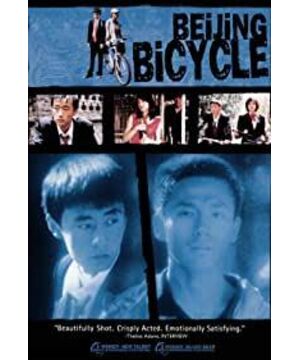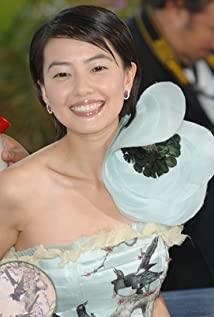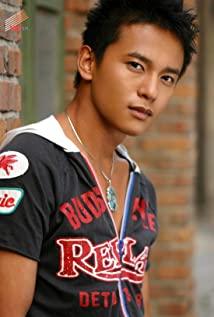Before Xiao Gui's happiness could be released, his car was lost; this fulfilled the dream of another young boy, Xiao Jian, but when Xiao Jian's joy had not been fully displayed, his car was also lost. .
As the most common means of transportation for Chinese people, this overly beautiful bicycle not only connected the whole play, but also became a symbol of the two boys' pursuit of identity, which is a well-calculated stroke in the film. And the two conspicuous uniforms (the courier uniform and the school uniform) of the two make it easier for people to understand the different ways of the two people's situation.
Or maybe youth itself is a bloody farce that makes people laugh out of nowhere, their desires and persistence are so fragile, wandering outside the door of adulthood, being pushed down by a sudden rudeness, knocking on the threshold, and immediately falling to pieces. In the disappointment and despair that there was no way out, Xiaojian and Xiaogui raised the bricks at different times and gave the final blow. But nothing can be undone. Xiaojian lay on the spot covered in bruises and wounds, and Xiaogui walked out of the camera with a completely broken bicycle.
Xiaojian's beautiful friend is so outstanding among the group of female high school students in the film, how she likes Xiaojian who is not in the dark is a problem, and then how can she keep up with a little bit of fun Even more inexplicable. On the one hand, the little nanny in Xiaogui's hazy is a symbol of urban and rural people set by the director, on the other hand, it indicates Xiaogui's feeling of love. But no matter how you look at it, it makes people feel like she has become a prop rather than a supporting role. When I saw the little nanny played by Zhou Xun from a distance, the unspoken sprouting, the emotional traces left in those deleted paragraphs, remained in the moment when the eyes of Agui and Zhou Xun met (I watched the 108-minute abridgement. Version).
There is only one reason to justify the film's imbalance: youth is inherently unbalanced and irrelevant, and when we face youth and youth, we will be as impatient as Wang Xiaoshuai. All of this should be forgiven, because our youth has passed; because our original intentions are always changing; because the women in memory and memory are only beautiful.
Wang Xiaoshuai uses long-term perspectives to express the plot several times. The most tense scene is the camera watching Xiaojian from a distance in the alley to stop the girl who has already empathized with him. He does not look at the characters in the film from a sympathetic position. There is also no intention to make the audience feel any emotion towards the characters. Almost all the shots are looking up and looking up. Wang Xiaoshuai's point of view is also from the point of view of a bystander. There are two close-ups in total. The climax of the scenes are indifferent and restrained.
I have always been puzzled by a question, is Brick really a symbol of adolescence for children who grew up under Huangchenggen Hutong? Whether it is Jiang Wen's Beijing in the 1970s, Lu Xuechang's Beijing in the 1980s, or Wang Xiaoshuai's Beijing in the 1990s, bricks have an irreplaceable status in adolescence. It's at least something that didn't show up in my adolescence, just knocking out walnuts.
Perhaps our youth is like that bicycle, full of gas and eagerly looking forward to every departure; however, when life smashes its skeleton and flattened its tires, youth is completely scrapped like that bicycle. No longer able to move forward. In the end, we have no choice but to mature.
Youth, just for these two words, constitutes the reason for tears. How could I forget those screams, those faces that were terrified and angry at being plundered again and again. I think of the teenagers I have witnessed, and the youth I am negatively consuming that will never return, all just to prove that the distance is nothing but the distance. I can't start walking backwards from this second, go back to the past, go back to my seventeen years old when I was in a hurry and lost my eyes, we can only fall into the threshold of adulthood according to the normal sequence with our protagonist, and be deprived of everything; It broke, the song stopped, the wheel broke, the car was destroyed, and it started to grow like crazy.
This film is one of the "Three Cities" series of films produced by Jiguang Film Company, which is run by Jiao Xiongping, a famous film scholar and film critic in Taiwan. The "Three Cities" series of films combines emerging directors from both sides of the Taiwan Strait and three places to jointly shoot six films, hoping to establish a new image for the new Chinese society in the 21st century, which is different from the previous generation of Chinese films that focus on sadness and historical review. The other five films are Taiwanese director Lin Zhengsheng's "Love You Love Me", Yi Zhiyan's "Blue Door", Xu Xiaoming's "Wandering to Fresh Water", and domestic director Jia Zhangke's "Shanghai Baby" and Hong Kong director Yu Liwei's "Shanghai Baby" People's Exchange".
Wang Xiaoshuai described an unavoidable reality with dexterous brushwork. In this space where we live, there is always the pursuit and anxiety about identity. He aimed the camera at this group of people who have been forgotten in this city. Acquired identity unrelated to puberty. Wang Xiaoshuai bid farewell to the conflict between metaphysical and metaphysical, and began to try to enter the core of the civilian population.
The soundtrack of the film is only two paragraphs, not much but it is concise and just right. A flute is used for the head and tail. There is always another piece of music with drum beats in the film when running and racing. The treatment is similar to "Country Rider" in "Sunny Day".
In the lines of the film, "Zhang Yimou" appeared once and "Qiu Ju's lawsuit" appeared once. I don't know what Wang's attitude towards Zhang is. There are also people in Beijing who call bicycle a bicycle. This word is used throughout the film, but the title of the film uses a bicycle. What is the purpose? Or just for a gimmick?
The scene where the sun shines in the gap between the leaves before Xiaojian's first kiss is exciting, and the scene where Xiaojian extends his hand to Xiaogui to exchange names is soothing. Xiao Gui's last blow contained too much.
This is a good film, a fairly true story derived from a documentary technique.
PS: Xiaogui's car was stolen by a thief, the thief sold it to a second-hand dealer (he may not know it was a stolen car), the second-hand dealer sold it to Xiaojian, and Xiaogui wanted to get it back by Xiaojian Bought car. I would really like to interpret this car from a legal point of view. Especially if the thief can't find it. Obviously, the director used a relatively objective method to record a natural way of handling the car, and it is not the subject of the film who the car belongs to legally. The moral standard of the film is not here, but I am Want to understand this.
[Note] The first draft of this review was completed in the winter vacation of 2005. This story about youth is undoubtedly too heavy. At the time, I probably still didn't have the ability to write an equally profound review. Many of the sentences in this review came directly from a few good reviews I read at that time, and I added oil and vinegar and then kneaded them together. Thanks to the original authors!
View more about Beijing Bicycle reviews









